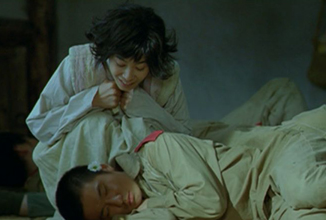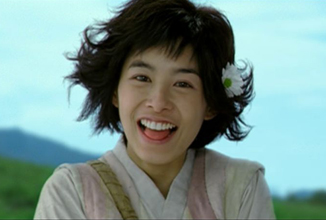"You see it's written here… when I say 'How are you?' the reply should be 'I'm fine. And you?' That's the correct American response. I don't understand why he's answering incorrectly. Do you think he's trying to pick a fight?"
1950 - The Korean War.
Welcome To Dongmakgol tells the story of two groups of soldiers, one from North Korea and one from the South, who inadvertently (and simultaneously) converge on the idyllic mountain village of Dongmakgol. This accidental convergence begins when a U.S. pilot named Smith (Steve Taschler) crash lands on the outskirts of the village and is taken in by the locals. Totally unaware of the war that is raging around them, they have no idea why he has arrived in their village and, when all attempts to understand what he is saying fail, they decide that the best course of action is to endeavour to make him feel at home and nurse him back to health anyway. They are soon joined by three soldiers serving in the North Korean army - Chief Commander Lee Su-hwa (Jung Jae-young), Private Jang (Im Ha-ryong) and Private Taek-ki (Ryoo Deok-hwan) - who, after being separated from the rest of their platoon and getting totally lost, meet a seemingly mentally challenged girl called Yeo Il (Kang Hye-jeong) who leads them to the village. On their arrival, the North Koreans find two South Korean soldiers - 2nd Lieutenant Pyo Hyun-chul (Shin Ha-kyun) and Army Medic Mun Sang-sang (Seo Jae-gyung) - already in the village and an intense standoff between the bitter enemies ensues, resulting in the accidental destruction of the villagers' food stores. Realising that they need to make amends, the soldiers agree to a temporary (and uneasy) truce and, as they reluctantly work together to rebuild the food stocks, they slowly come to realise that Dongmakgol is a utopia where worldly feuds have no place. However, when the war outside directly threatens to destroy the villiage, the soldiers are forced to make a difficult choice: be true to their countries, continue their hatred of each other and allow the obliteration of a place, and a group of innocent people whom they have come to care about; or put aside their differences, once and for all, and fight together to save Dongmakgol...
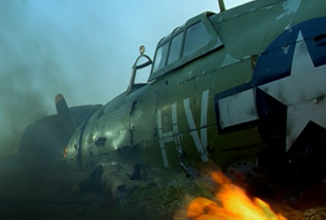 |
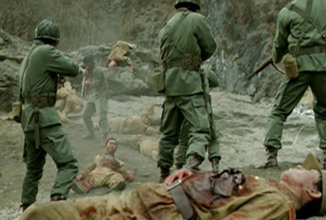 |
While a story of mortal enemies grudgingly setting aside their differences for the greater good (and, in the process, rediscovering their humanity) is certainly nothing new, Welcome To Dongmakgol succeeds in standing out as refreshingly different due to the genuine warmth it exudes and the gently funny humour provided by the quirky eccentricities of the village's inhabitants. Of course, it is vital that characters as innocent (and unaware of the outside world) as these, do not simply appear as annoyingly naive and, thankfully, well thought out dialogue, along with perfectly timed set pieces, ensure that this is never an issue.
In the early stages, the film plays as a war epic which pulls no punches but, even here, there are several indications of the forthcoming changes in tone which serve to ease the transition - from war film to uplifting story (with large amounts of quirky humour) - well in advance:
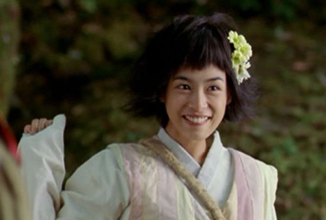 |
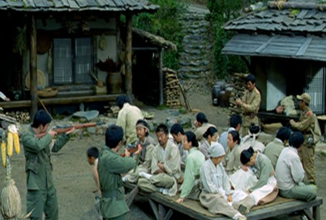 |
The first of these occurs just a few minutes into the film as Smith's plane plummets towards the ground. A scene full of noise and fury, it suddenly becomes tranquil (majorly slowing in speed in the process) as a single butterfly briefly appears outside the window of the crashing plane. No sooner has the butterfly gone than we are returned to the scene as it was before and the plane crashes to the ground at exhilarating speed. Though we are unaware of it at the time, we are subtlety being shown the difference between the loud, violent, outside world and the beauty and tranquility of Dongmakgol, and this (combined with another scene of the North Korean soldiers similarly encountering butterflies, just before they meet Yeo Il for the first time) means that, by the time she arrives and tells her first wacky tale, we have already accepted the genre change and feel relatively familiar with the village - even before we have seen it.
From that point on, the intelligent writing brings believable openness and friendliness from all of the village inhabitants, not only cementing viewer empathy firmly in place but also ensuring that we truly feel at home in the village, and thus subsequent references to the war and the outside world really feel like a threat to us, as much as a threat to the characters.
In a nutshell, the success of a relatively simple story, such as this, is utterly dependent on the extent to which viewers care about the characters' plights, and the efforts taken to make us feel welcome in Dongmakgol almost guarantee that we really do care what befalls them.
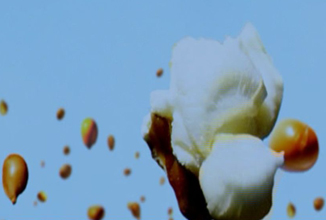 |
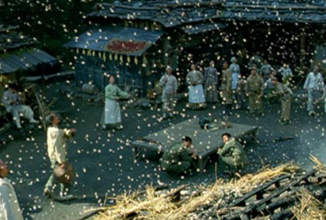 |
Direction and cinematography are both accomplished, with changes in pacing, framing and the use of vibrant colours within Dongmakgol, (compared to a blander, more realistic, palette outside) further increasing the idea of warmth and comfort inside, compared to harshness outside. CGI is used quite extensively and, for the most part, works exceedingly well - in fact, the only scene where its limitations are noticeable is in the wild boar section of the film. That said, the CGI doesn't detract from the scene to any major degree and it still succeeds in being enormously entertaining.
Cast:
The performances of the Korean cast are universally of a high calibre, and special note should be made of Kang Hye-jeong’s portrayal of Yeo Il - she clearly loves playing the part of this "crazy girl" and does so with aplomb, making it totally her own throughout.
However, the performance of American actor Steve Taschler (as Smith) is frankly abysmal - overacted and overplayed throughout - and is, in fact, so bad towards the conclusion of the film that it single-handedly threatens to ruin a pivotal scene.
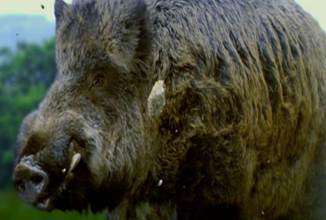 |
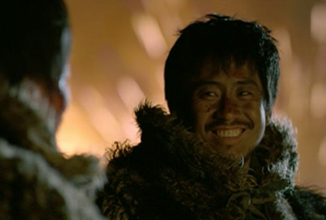 |
Summary:
An uplifting and gently funny tale, told with genuine affection and served up with copious amounts of popcorn (watch the film and you'll understand what I mean), Welcome To Dongmakgol reminds us that, whatever our beliefs and whatever the causes for which we fight, we should never forget our humanity.
Cast (Character... Actor):
Yeo Il… Kang Hye-jeong
2nd Lieutenant Pyo Hyun-chul… Shin Ha-kyun
Army Medic Mun Sang-sang… Seo Jae-gyung
Chief Commander Lee Su-hwa… Jung Jae-young
Private Jang… Im Ha-ryong
Private Taek-ki… Ryoo Deok-hwan
Smith… Steve Taschler
DVD:
The DVD used for the review is the UK (Region 2) release from Cine Asia, provided as an anamorphic transfer with an aspect ratio of 2.35:1. The image is, for the most part, clear and sharp but there are some noticeable digital artifacts present in the fastest moving scenes of the film which are clearly a result of the transfer process. Sound is a choice of Dolby Digital 5.1 and Dolby 2.0 and both of these are crisp and clear. Excellent English subtitles are also provided for the main feature and all of the extra features.
*NOTE: Welcome To Dongmakgol has recently been re-released by Cine Asia under the title of Battleground 625. However, the DVD contents of both releases are, in fact, identical.*
DVD Extras:
"The Making of Dongmakgol" Featurette
"Dongmakgol Titling" Featurette
CGI Featurette
2 Easter Eggs
Trailer Gallery
DVD
Details:
• Director: Park Chan-wook
• Format: PAL,
Anamorphic, Widescreen, Subtitled
• Language: Korean
•
Subtitles: English
•
Sound: Dolby Digital 5.1
• Region: Region 2
• Aspect Ratio:
2.35:1
• Number of discs: 1
• Classification: 15
• Studio:
Cine Asia
|










